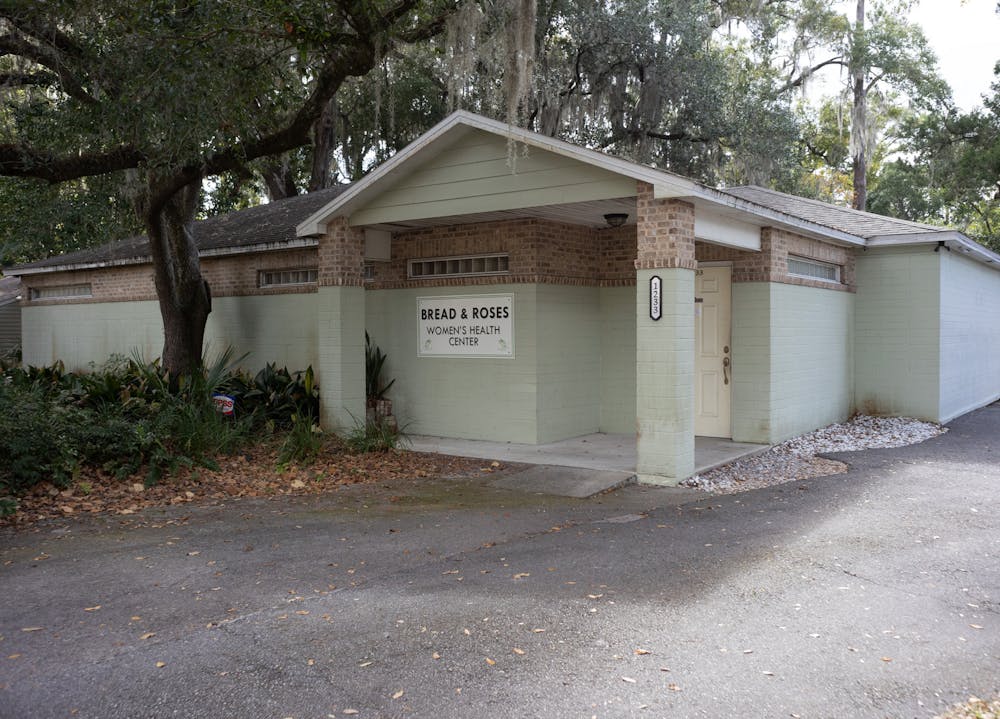Andrew Scholberg has been arrested 13 times. But that doesn’t deter the 71-year-old freelance writer and pro-life activist from continuing the work he’s been doing for almost 50 years — standing outside abortion clinics to pray and offer alternatives to women entering the building.
A MoveOn petition created Nov. 2 asks the Gainesville City Commission to deter abortion critics like Scholberg from gathering outside Bread & Roses, one of Gainesville’s two abortion clinics. The petition, which gathered over 700 signatures in the week and a half since its creation, encourages signers to ask the commission for “No Loitering or Solicitation” signs along Northwest 10th Avenue.
Protestors on the sidewalk outside the clinic “gather to intimidate, harass, assault and disturb” both employees and patients, the petition said.
“I have watched them scream at people walking into the clinic for health care, often even chasing them onto the Bread & Roses property,” the petition’s creator said, who asked to remain anonymous for personal safety, in an email to The Alligator.
Pro-life groups say they will take clients’ babies or repeat incorrect information about when the baby has a heartbeat, all as a method of intimidation and harassment, the petition’s creator said.
Buffer zones in Gainesville: A 10-year conversation
This isn’t the first time Bread & Roses protests have come to the City Commission’s attention.
In October 2012, then-commissioner Lauren Poe brought a referral to the commission asking the city attorney and the Gainesville Police Department to research the need for buffer zones around women’s medical clinics.
Then-Police Chief Tony Jones’ answering report stated the last recorded physical disturbance at any Gainesville abortion clinic had occurred seven years prior.
Jones’ research also showed buffer zones historically encourage pro-life individuals to taunt police into making arrests ending in long legal battles. Based on little evidence of disturbance outside Gainesville clinics, he recommended the committee stop moving forward with the idea.
Stephanie Marchman, the then-city attorney, also discouraged the referral. In her March 2013 report, she pointed out there are already laws stopping protestors from disturbing neighborhood peace — including Florida statutes against trespassing, stalking, and blocking sidewalks.
Based on the police chief and city attorney’s testimony, Public Safety Committee members voted 3-0 to hold the item in the committee, and it never made it to the City Commission.
Scholberg, a Gainesville resident since 2012, was one of a handful of pro-life protestors who spoke during committee discussions. He remembers the incident well, he said.
“[Poe] was very pro-Bread & Roses, anti-freedom,” Scholberg said. “You know, he really loved the idea of this kind of ordinance – shut down these nasty pro-lifers.”
In 2019, Poe brought the issue to the commission again — this time as mayor. Commissioners agreed to restart the process of collecting data to show whether pro-life demonstrations were a barrier to abortion-seeking clients, he said.
Once that evidence was built, there would be justification for creating a buffer zone, Poe said. He started the process after talking with Bread & Roses’ owners, he said.
“There were some circumstances where people were in the road, and that creates a safety issue,” he said. “But — and I can only speak for myself — that wasn’t the primary concern. It was more about the safety and well-being of the clients using the facility.”
The coronavirus pandemic began right after GPD began doing surveillance and collecting information necessary to defend the case in court, Poe said.
Because of the pandemic, the City Commission couldn’t gather any photographic or numerical data to move forward with the issue, and it was abandoned for the second time.
Then-Commissioner Adrian Hayes-Santos championed the issue alongside Poe. Hayes-Santos tried to curb anti-abortion protests after he worked as a volunteer for Bread & Roses and saw firsthand the impact of protestors on the clinic, he said.
“People do have the right to protest, but they also can't interfere with people trying to access health care,” he said.
Another resolution, proposed in 2022 as a response to the statewide 15- and six-week abortion bans, would ensure city resources not be spent investigating new abortion crimes and delegate such crimes as low priority for GPD, Hayes-Santos said.
Like the buffer zone idea, the issue is still sitting in the city attorney’s office, Hayes-Santos said.
Hayes-Santos hopes there is enough support on today’s majority-progressive commission to move the buffer zone resolution forward now that the petition has pushed it back into the public conversation, he said.
If the issue does come to the commission, Scholberg will speak at meetings, but he doesn’t think the resolution will ever pass, he said.
“They could get 20,000 or 30,000 signatures, however many, it doesn’t matter,” he said. “I think that the city attorney would have the good sense just to say, ‘We're not doing this.’”
Abortion protests in a post-Roe Florida
Clinic buffers have sparked contention for decades. But the overturn of Roe v. Wade re-ignited the issue — especially in Florida, which has become an access point for women seeking abortion in the South after bans in states like Alabama and Mississippi.
In 2022, 6,708 people traveled to Florida from out of state for an abortion, a 38% increase from the previous year, according to the Florida Agency for Health Care Administration.
In the months following the Dobbs decision, Clearwater passed a five-foot buffer zone ordinance around its Bread & Roses abortion clinic at a recommendation from the city’s police chief when protest activities created an unsafe situation for passing cars.
Florida Preborn Rescue, a pro-life sidewalk counseling group, filed a lawsuit against the city in June. The buffer zone limits freedom of speech and — because the group is faith-motivated — freedom of religion, said Scott Mahurin, the nonprofit’s 49-year-old director.
“Pro-lifers have every right to be on a public sidewalk,” he said. “We don’t yell and scream at anybody … my team has never had any legal issues, no one’s ever called the police on them.”
The buffer zone is also selectively enforced, he said. Clinic employees walk through the zone to guide clients to cars while shielding them from protesters with umbrellas. By contrast, if people from his group tried to take one step into the zone, they would get cited, he said.
A judge shot down Florida Preborn Rescue’s lawsuit in a September hearing. The group filed to the appeals court in Atlanta in October, and is waiting to hear whether the zone will remain in place, Mahurin said.
Scholberg, who is not part of an official group but gathers with the same pro-life associates most Tuesdays and Thursdays outside Bread & Roses, was cited $100 in July after a skirmish broke out between him and a clinic employee. Scholberg brought the citation to court with the help of the Catholic law firm Thomas More Society, and the charge was dropped before the hearing.
Scholberg is hopeful the law will continue to come down in favor of the pro-life movement. His group has long faced public pushback — including one passerby who threw dog poop at the sidewalk where they stood — but Scholbert has no plans to stop his work, he said.
“How can I face God when my life is over if I don’t do something?” he said.
Neither the petition nor any buffer zone suggestion has come before the City Commission thus far, city of Gainesville spokesperson Rossana Passaniti said.
Contact Zoey Thomas at zthomas@alligator.org. Follow her on Twitter @zoeythomas39.
Zoey Thomas is a media production junior and The Alligator's Spring 2025 data editor. She previously reported for the metro, university and enterprise desks. In her free time, you can find her reading, crocheting or arguing for the superiority of sweet potatoes over regular potatoes.






